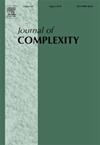具有推理误差界的地理不可区分位置混淆
IF 1.8
2区 数学
Q1 MATHEMATICS
引用次数: 0
摘要
地理不可分辨性和预期推断误差是位置隐私的两个互补的统计概念。差分隐私(不可区分性)和失真隐私(推理错误)的联合保证限制了信息的泄露。本文分析了Yu, Liu和Pu (NDSS 2017)提出的动态位置混淆机制PIVE,并表明PIVE不能像声称的那样对自适应保护位置集(pls)提供任何一种隐私保证。具体来说,我们证明了由于定义的搜索算法,不同的PLS可能会彼此相交,并且同一PLS中的不同先验位置可能具有不同的保护直径,这导致PIVE的局部差分隐私证明存在问题。此外,还证实了PIVE中引入的条件不足以限定针对贝叶斯攻击的预期推理错误。为了解决这些问题,我们引入了一个宽松的地理不可分辨性定义,提出了几种校正方法,并分析了它们满足的隐私特征。本文章由计算机程序翻译,如有差异,请以英文原文为准。

Geo-indistinguishable location obfuscation with inference error bounds
Geo-indistinguishability and expected inference error are two complementary statistical notions for location privacy. The joint guarantee of differential privacy (indistinguishability) and distortion privacy (inference error) limits the information leakage. This paper analyzes the dynamic location obfuscation mechanism called PIVE by Yu, Liu and Pu (NDSS 2017), and shows that PIVE fails to offer either of the privacy guarantees on adaptive Protection Location Sets (PLSs) as claimed. Specifically, we demonstrate that different PLSs could intersect with one another due to the defined search algorithm, and different apriori locations in the same PLS could have different protection diameters which causes the problematic proof of local differential privacy for PIVE. Besides, the condition introduced in PIVE is confirmed to be not sufficient for bounding expected inference errors against Bayesian attacks. To address these issues, we introduce a relaxed definition of geo-indistinguishability, propose a couple of correction approaches, and analyze their satisfied privacy characteristics.
求助全文
通过发布文献求助,成功后即可免费获取论文全文。
去求助
来源期刊

Journal of Complexity
工程技术-计算机:理论方法
CiteScore
3.10
自引率
17.60%
发文量
57
审稿时长
>12 weeks
期刊介绍:
The multidisciplinary Journal of Complexity publishes original research papers that contain substantial mathematical results on complexity as broadly conceived. Outstanding review papers will also be published. In the area of computational complexity, the focus is on complexity over the reals, with the emphasis on lower bounds and optimal algorithms. The Journal of Complexity also publishes articles that provide major new algorithms or make important progress on upper bounds. Other models of computation, such as the Turing machine model, are also of interest. Computational complexity results in a wide variety of areas are solicited.
Areas Include:
• Approximation theory
• Biomedical computing
• Compressed computing and sensing
• Computational finance
• Computational number theory
• Computational stochastics
• Control theory
• Cryptography
• Design of experiments
• Differential equations
• Discrete problems
• Distributed and parallel computation
• High and infinite-dimensional problems
• Information-based complexity
• Inverse and ill-posed problems
• Machine learning
• Markov chain Monte Carlo
• Monte Carlo and quasi-Monte Carlo
• Multivariate integration and approximation
• Noisy data
• Nonlinear and algebraic equations
• Numerical analysis
• Operator equations
• Optimization
• Quantum computing
• Scientific computation
• Tractability of multivariate problems
• Vision and image understanding.
 求助内容:
求助内容: 应助结果提醒方式:
应助结果提醒方式:


